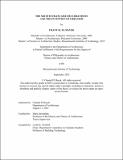The Société Française des Urbanistes and the Invention of Urbanism
Author(s)
El Hayek, Chantal
Downloadthesis PDF (88.98Mb)
Advisor
Jarzombek, Mark
Terms of use
Metadata
Show full item recordAbstract
This dissertation demonstrates that it was the Société Française des Urbanistes
(SFU) that invented urbanism in the interwar period, rooting it in Henri Bergson’s
theories of creative evolution and Paul Vidal de la Blache’s principles of human
geography. Scholars have historically overlooked this contribution, and do so even today.
They define urbanism generically, mostly describing a positivist science of spatial
organization, incorporating infrastructural, hygienic, and social engineering systems.
Rectifying this misconception, I reveal how this group of practicing architects and
theorists—attempting to offset the erosive effects of commercialism on cities—forged, in
1911 in Paris, a reformist alliance founded on faith in metaphysics and social science. In
coining the term urbanisme, SFU established the field based on principles that defied
positivist notions of urban development and deterministic ideas of human evolution.
I analyze SFU’s spatial schemes and written oeuvres, in concert with
contemporaneous scholarship on urban theory, geography, and philosophy, to contend
that Bergson’s anti-positivist discourse on time and consciousness is central to our
understanding of urbanism and its origins. Besides establishing the professional, legal,
and academic foundations of urbanism in France, SFU engaged in a global urban reform
campaign, drawing up restructuring schemes for cities in Europe, North and South
America, the Eastern Mediterranean, North and East Africa, and Southeast Asia. They
scripted numerous architectural treatises, essays, and legal texts, and organized
international conferences to debate methods of reforming post-WWI cities. This
formidable production had a profound impact on the cities and subsequent generations of
planners who grappled with the problem of mitigating industrialization’s negative
outcomes. The dissertation charts the group’s social networks by tracing the genealogy of
ideas by Western thinkers that influenced SFU’s conception of urbanism. It displays the
ways in which SFU applied these ideas in distinctive settings, revealing the cultural
influences these planners exerted on administrators and policy makers. Ultimately, the
dissertation shows that SFU established urbanism as a “scientific art” of territorial
development, emphasizing inventiveness and individual experience and seeking to
reconcile the conditions of the modern city with the allegedly timeless features that
characterized the pre-industrial landscape: spiritualism, nature, tradition, and art.
Date issued
2023-09Department
Massachusetts Institute of Technology. Department of ArchitecturePublisher
Massachusetts Institute of Technology